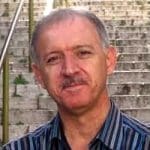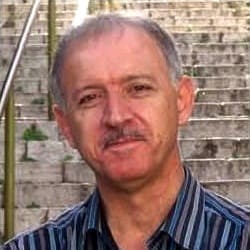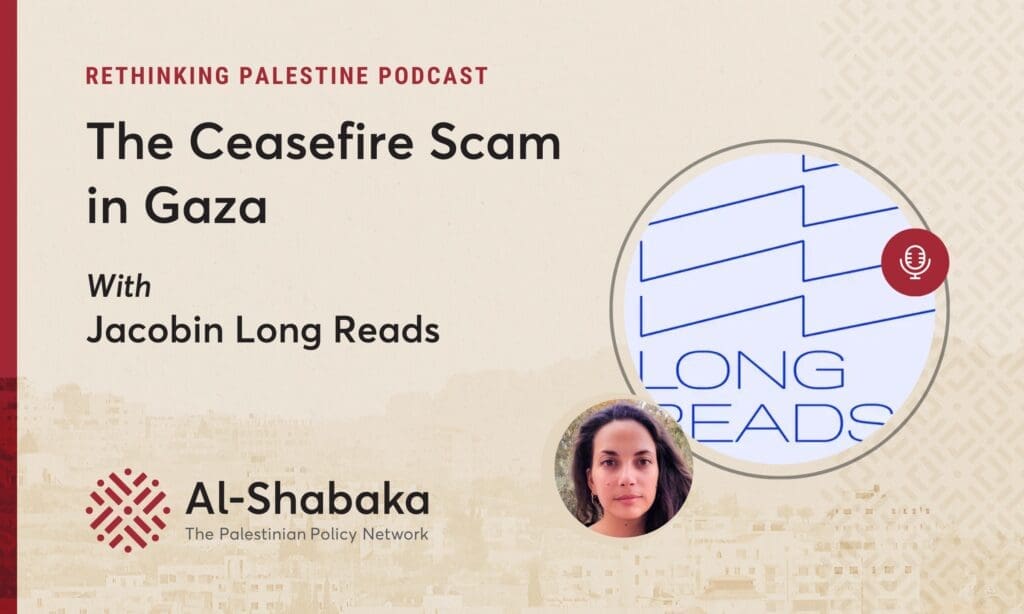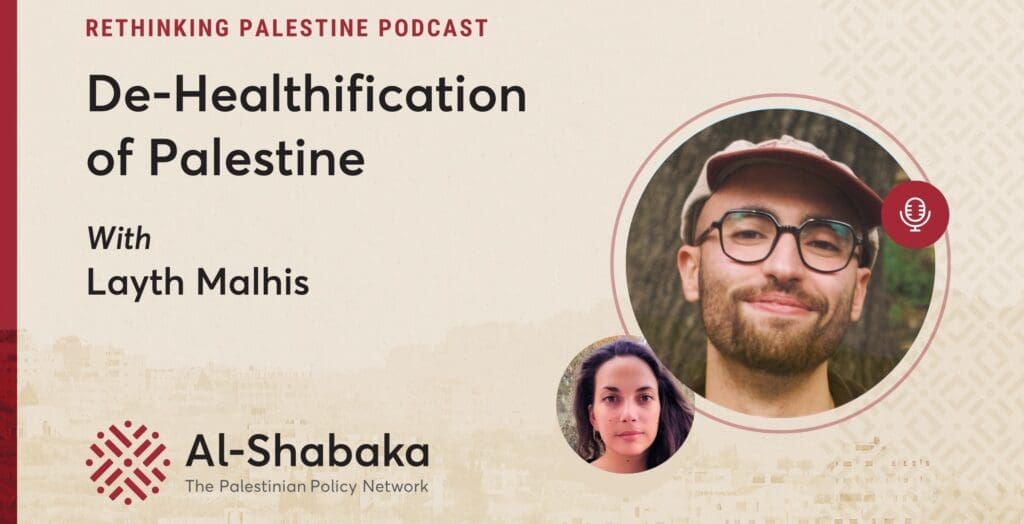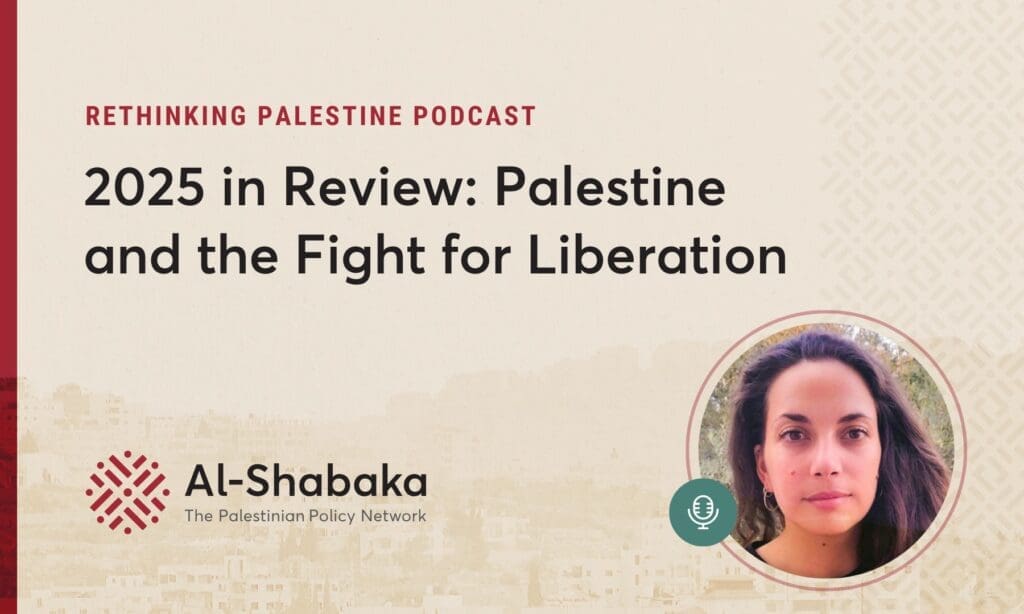About This Episode
Episode Transcript
The transcript below has been lightly edited for brevity and clarity.
Ameer Makhoul 0:00
For the Israelis, they want to keep the state as it is. Because it’s a Jewish state, it’s their state — not to allow the new elites to change it. They are very militarized demonstrations. The military voice, the security voice, is very high. They are totally Israeli. They have a very strong Israeli identity, which is a very deep Zionist identity.
Yara Hawari 0:29
From Al-Shabaka, the Palestinian Policy Network, I am Yara Hawari, and this is Rethinking Palestine.
Since the beginning of 2023, Israelis have been hitting the streets in the hundreds of thousands to protest Netanyahu’s government plans for judicial reform. The plans are seen by many Israelis as an attempt by the Prime Minister, who’s been prosecuted on corruption charges, to rein in the judiciary and give the Knesset, the Israeli parliament, the power to override Supreme Court decisions.
The demonstrations have been dubbed the “pro-democracy” protests by much of the Western media because protesters claim to be standing up in defense of Israel’s democracy. This narrative completely ignores the fact that the Israeli regime rules over millions of Palestinians who have no say whatsoever in who governs them, and that democracy in a settler colonial apartheid context can be nothing more than a facade.
Joining us to discuss this in this episode is Ameer Makhoul, former director of the Haifa-based Ittijah, the Union of Arab Community-Based Associations, political commentator, and a member of Al-Shabaka. Thank you for joining us.
So, Ameer, can you tell me a bit more about these proposed judicial reforms and why so many Israelis are unhappy with them?
Ameer Makhoul 1:52
Yeah, on its face, on the surface, it sounds like changes in the judicial aspects in terms of who rules — the government or the Supreme Court. And if the government is accountable to the Supreme Court, or if the Knesset is accountable to the Supreme Court. This is one of the main aspects.
And the other one is to change, to politicize the judge appointment committee — which is to make it more political and to give more power to the political parties, especially to the coalition, and less power to the Supreme Court judges. But I think there is a different agenda behind that, because it’s not the goal by itself. It’s to change the platform, the Israeli platform, in order to make another political enterprise, which is on the mind of Netanyahu, on the mind of the right wing, and on the mind of the Zionist religious parties, which are not so concerned with the judicial aspects of Israel. They are concerned with different matters of what to do with the Palestinians in the whole of Palestine. There is no Green Line in their eyes. But there is one line, which is one state — the land of Israel, in their definition.
So I think it’s a real discussion and debate in the Israeli political sphere. It looks like the whole Israeli system is in crisis. That began with the crisis of who will lead the government, but now it’s more of a crisis about the definition of Israel by its own self, without the Palestinians. But it’s also the struggle, or the fight, between two elites — one that grew out of the war of 1967, and one who established the state in 1948 with the Nakba.
So there are very different elites, in fact. It became a big crisis for Israel. I think it began not because of the judicial system — it began because of the difficulty of the state to rule itself and to keep silent the whole cleavages and internal fights of identity, of elites, of power, and who will control Israel, who will control the army. Everything became part of this crisis, which has no exit, no relief that could be seen in the near future at least. It looks like it’s going to be a long-term crisis with internal Israeli confrontations between powers — not only political parties, it’s more like who leads this state.
So Israel has become weaker strategically, but it’s tougher internally. Maybe it’ll be different after the coming months or years, but things are not going to be as they used to be since November 2022.
Yara Hawari 5:08
So this is obviously a tension that has been rising for a long time between different political actors and different political ideologies within Israel. And it seems like the judicial reforms were really just sort of the catalyst for these protests.
But I wanted to ask, who specifically is attending these protests? What kind of Israelis are we seeing on the streets?
Ameer Makhoul 5:35
In fact, formally, there are over 100 groups who are taking part in the protest movement. It’s not one group, and it’s not only the political opposition — it’s much wider. It’s like a mixture of political parties, political powers, economic powers, the high-tech security system, Shabak, Mossad, the army, and the police, which are all involved in such demonstrations. And also we can see that there are civil society organizations, Zionist civil society organizations, and we can see that it’s very wide politically.
On one side, there is Meretz, a liberal Zionist party, and on the other side there is Yoaz Hendel, from a settler background — he used to be a minister in the previous government. So it’s very wide, and there are Likud supporters also. It has a very wide participation. The masses are from all the political approaches, and also there are powers feeding such a movement to be sustained.
Internally, the high-tech industry, for example, feels that they are very threatened by the judicial changes. And there is some kind of consensus between the former chief of staff and the chiefs of the Mossad and Shabak, who are part of the movement. Most of them are soldiers in the reserves. In general, the protests are mostly Ashkenazi. We can see there is a lack of Oriental Jews — Jews from Arab countries.
But it’s a very strong movement. Lapid is not the leader. And maybe Gantz became more empowered because of his army and military background. But these groups represent a wider range of political approaches. So we can find the left wing on one side and the right wing on another, but we can see only one flag, which is that of Israel — which they reclaimed, not by the old right-wing groups, but it’s the first time it’s been reclaimed by the liberal Zionist groups as their flag. Sometimes we can find Naftali Bennett opposing the government on certain positions, but he is not opposing them on the other side of their activities.
So I think it’s a very strong movement. Of course, Palestinians are not there. And the anti-Zionist groups or the anti-occupation groups — they are also there, but they are by themselves, as they tried to have an entity, a group that is called “Against Occupation.” It exists, but it’s not the masses. In fact, the masses are the Zionist center, liberal Israeli groups.
Yara Hawari 8:39
So we can’t quite call these protests grassroots, because we’re seeing these big political institutional figures like Gantz, like Lapid, like even Tzipi Livni, the tech industries, army reserves — all of these groups and actors are taking part. And am I right in thinking that these groups and actors are also funding these protests? So this is coming from the heart of Israel’s political institution.
Ameer Makhoul 9:11
It’s very difficult in general to define what is Israeli civil society or grassroots organizations. It’s not so easy because it’s very politicized in general. So many groups and powers are taking part in that. But I can say there are some grassroots organizations, but they are not the voice of the protests.
It’s not like people who are opposing the state are protesting against the state. There are people who are going to the streets in order to protect the state, which is different from the definition of grassroots in general. Because grassroots is to escape the scope of activity of the civil society or the society itself, not to improve the state itself. So it’s different definitions.
But I think there are some groups in any case which are part of that. Like, if I take the supporters of Meretz, for example — there are many grassroots organizations with Meretz’s political agenda, and they’re behaving as grassroots or civil society organizations. But it’s motivated by powers, not by spontaneous demonstrations. Nothing is spontaneous here. It’s very politicized. It’s very strong on one side and it’s massive, but it’s not grassroots.
Yara Hawari 10:32
This is a very important point that you mentioned — that these protests are about protecting the state of Israel and about saving the state of Israel as a Zionist state. And this sort of leads me on to my next question.
Some commentators have compared these protests to the Arab Spring and have even gone so far as to use the word “intifada,” the Palestinian word for uprising. Aside from noting that this is an incredibly offensive comparison, how would you explain that these protests are so far removed from the revolutionary moments we witnessed in the Arab world over a decade ago, and from the Palestinian intifadas?
Ameer Makhoul 11:15
It’s totally not an intifada. Intifada is a movement of masses of people who are part of a national liberation movement. It’s part of people’s voice in order to be liberated from occupation. Totally not the same. It couldn’t be the same. In fact, it’s insulting to Palestinians to somehow call this an intifada.
And it’s very different from the Arab Spring. Because in the Arab countries, people moved in order to change the regimes, in order to change their status, the ruling state, in order to fight the so-called deep state, which controlled their life, their everything, their rights, their freedoms, and their future. For the Israelis, they want to do exactly the opposite — to keep the state as it is, because it’s a Jewish state, it’s their state, and not to allow the new elites to change it. Even if it looks similar on its face, it’s not similar in the essence of that. It’s totally different.
The other aspect of the Israeli demonstrations: they are very militarized demonstrations. The military voice and the security voice are very high. People are saying, “We are going to the army, we’re protecting the Israelis, we are protecting all citizens. So we don’t agree that we’ll be led by ministers who are not serving in the army, like Ben Gvir and Smotrich.”
They are totally Israeli. They have a very strong Israeli identity, which is very deeply Zionist — that “we have to protect our state, to defend it in order to be able to overcome all of our enemies.” This is the language and the debate. Nobody is speaking about the occupation. Nobody is speaking about changing the regime. Nobody is speaking about making it a state for all its citizens, not only for Jews.
The opposition to Netanyahu is in line with Netanyahu in supporting the Jewish state. All of them support the law of confiscating the citizenship of Palestinians.
So it’s not a matter of anybody wanting to change the nature of the state. They want to keep the nature of the state. So this is the real agenda of the opposition. The real agenda of the coalition is also different. In fact, the real agenda is more important than the agenda that we can see from the media. The real agenda of Smotrich is the annexation of the West Bank — to legalize the settlements and to legalize the terrorist groups in the West Bank. And the other side of the agenda is what Ben Gvir is looking for. He’s looking for ethnic cleansing of Palestinians inside the Green Line. And both are working at very complementary levels.
I think Smotrich is much more dangerous, in fact, because he’s thinking strategically. But they are the only ministers who are dealing with the Palestinian cause today, and they are very dangerous for the Palestinian cause. So the agenda for Netanyahu is to feel free and not to go to prison. So it’s not even a state agenda. It’s a very sectarian agenda of each part of the coalition.
In the past decades, the army of Israel used to be the major structure, not only for war and defense — in their language, and occupation, etc. — it was a socialization system for the Israelis and the recreation of the Israelis as they are today. But now it looks like it will never be like how it was just three months ago. I think it will be more like private arms, and it looks more professional, less massive, and less popular. So this aspect will lead to ideas of fascism and will make the internal Israeli tensions into internal fights. No system could moderate such tension in the future.
Yara Hawari 15:49
If you’re enjoying this podcast, please visit our website, al-shabaka.org, where you’ll find more Palestinian policy analysis, and where you can join our mailing list and donate to support our work.
Ameer, there’s been a lot of Israeli commentary about the fact that Palestinian citizens of Israel are not attending these protests. Now, we sort of might take that for granted, but what is your analysis on why that is the case?
Ameer Makhoul 16:18
I think it’s not political laziness from the Palestinian citizens of Israel. It’s a political statement. The Palestinian citizens of Israel are excluded by both powers — by the coalition and by the opposition.
Lapid didn’t want Palestinians to be in his struggle or political battle. And the same with Gantz, and the same with the religious parties. They don’t want to be partners with the Arabs, from both the essential point of view and also from a tactical point of view — that they don’t want to give Netanyahu the accusation to attack them, that they are “friends of the Arabs,” which is a very bad word in Israel.
But Palestinians in Israel — they don’t feel that they are part of such a struggle. Because for seven decades, we speak about the Supreme Court, but it’s not the Supreme Court for justice. For Palestinians, it’s unjust, in fact — and not only for ’48 Palestinians, but for all Palestinians together. People don’t feel that they have to protect the Supreme Court or the deep state. The deep state, for Palestinians, citizens or not citizens of Israel, is the occupation, the state of systematic racism, the state of the law of the Jewish state and national state, the laws of immigration, and the laws of citizenship.
Some voices are like, “We have to distinguish between the worse and the much worse.” But it doesn’t make any sense to the people. For Palestinians, it’s also important to see that the Supreme Court is not the sample or the icon of justice. People are going to the Supreme Court, they have petitioned the Supreme Court, not to seek justice — it’s more to empower themselves. This is what Adalah is doing. This is what legal organizations are doing. And even if you listen to what Judge Barak debated, he said that the Supreme Court protected Israel like an army. So we’re not in the same place.
They’re protecting their system and their mechanisms of ruling, but we are victims of these systems. There is a debate among the Palestinians on whether we have to demonstrate within our towns and villages. It doesn’t make any sense for the Israelis, who couldn’t influence this state.
With the current platform of Israel, we can influence — not in terms of the resolutions, but we can empower ourselves. I think the human rights debate makes us feel more powerful, but it’s not alone — it’s with demonstrations, with popular activity, with public-sphere activities, etc. But it’s not by itself. The Palestinian Arab Knesset members in the Arab parties are not influential at all in the Knesset.
People felt that they don’t want to see this government continue because they can see it was a very risky government for us and very risky for Palestinians in general, for us as a people. But we shouldn’t be part of the Israeli protests. We’re excluded from the Israeli political sphere. And there is a consensus, a Zionist consensus, which is supporting that — of Lapid, of Gantz, of Netanyahu. And it’s a very strong position.
I think our agenda should be how we can protect ourselves these days and how we can prevent real attacks against our basic rights. There is an attempt now in the political enterprise to call the High Follow-Up Committee illegal, to consider it illegal, and to prevent political parties from running in the Knesset in the future. Or the issue of citizenship, which became not guaranteed for Palestinians inside Israel. So this could be a real agenda.
So we have to work much more as Palestinians inside Israel. We have to be very well coordinated with all Palestinians, especially in the West Bank and Jerusalem. And also to think about how we can protect ourselves against policies of ethnic cleansing — like in Naqab, like in the coastal cities, which are at risk.
The plans are very clear on how to use this so-called National Guard, which is Ben Gvir’s militia, or to use the other militias that have been de facto established in the cities — of Bir al-Saba’, in Bat Yam near Yaffa — in order to oppress the Palestinian citizens. And they are armed and semi-formal, and they’re active now.
Our agenda is to protect ourselves and not to protect the state, which doesn’t protect us at all. The state doesn’t take any responsibility for the Palestinians in terms of security, feeling secure, feeling protected, etc. They decided to establish the National Guard. They decided to use the army within the Palestinian cities and towns, and also to give free hands for the so-called system of organized crime to distract the Palestinian society from within. So this year, 45 Palestinian citizens of Israel have been killed by the Palestinian mafia, which is backed by the Shabak and by the state itself.
It has a functional aspect — to implement policies and to weaken the Palestinians internally. And Palestinians in Israel today are the most, until now, organized group within the Palestinian people. To weaken them is not a goal to weaken this group only — it’s a goal to weaken the whole Palestinian people, because we are taking part to protect Al-Aqsa, to protect Jerusalem, to protest against the wall and the occupation in Gaza and the West Bank, and to protect Palestinian political prisoners. So these aspects are going to be targeted by these policies of the government.
Yara Hawari 23:18
Ameer, you’ve made many important points, including that the Israeli Supreme Court has been a key mechanism in oppressing Palestinians across the so-called Green Line and in defending Zionism. So it’s understandable that Palestinian citizens of Israel are not joining these protests.
Now, you also mentioned Ben Gvir’s National Guard. And just for a bit of context for the audience: Netanyahu made a concession to delay the judicial reforms, which were seen as a win for many of the protesters. But as part of that concession, he promised Itamar Ben Gvir, an extremist member of the coalition and Minister for National Security, a new National Guard, which will reportedly be focused solely on policing and oppressing areas in which Palestinian citizens of Israel live — like Lyd, Ramleh, and the Naqab. Many are calling this Ben Gvir’s private militia. Can you tell us a bit more about this?
Ameer Makhoul 24:20
It’s also important to see why Netanyahu did that, because this is the real agenda of Ben Gvir. Ben Gvir is not busy with the judicial system at all. He’s not busy with the public opinion of the international community — nothing. In fact, the same with Smotrich. He came to the government from the last election under the slogan, “Who are the owners of this homeland?”
In fact, Netanyahu decided to give him this present in order to keep him in the coalition. So Ben Gvir got his demand. It’s important to see that the National Guard had been decided by the Israeli former government of Bennett and Lapid. It’s not Netanyahu’s decision. And this was an outcome of the 2021 uprisings of the Palestinian community inside Israel, which was at the same time as Sheikh Jarrah, with Gaza, and with the whole of Palestine.
The Israeli evaluations, especially of the army and Shabak, were that they have to empower the policing system inside Israel, and to empower it in order to deal with the Palestinian citizens of Israel — not with the whole policing system. And the idea was that this guard would be part of the security system of the Israeli police and the border guard, which is civil-military, in between the police and the army. This system is working in the West Bank, and the same is working inside the Green Line.
So the idea was to empower the so-called control system, to empower the oppression system, and to prevent any possibility that Palestinian citizens of Israel could make a new front — an internal front. It was like the first time that it had been announced that the military was used to evaluate the events and how to consider the Palestinians inside Israel as a new front.
What Netanyahu did is that he promised, and took a decision after that in the government, that this National Guard would be accountable to the minister himself, not to the police system. And it’s the first time in Israel that the security power will be under the direct control and order of the minister. So it’s clear that the statement behind that is, “We will consider Palestinians as the enemy” — Palestinian citizens.
And that means that we are at real risk, because although the police system is very tough with the Palestinians, it’s very violent — not like with the Jewish community — but the National Guard will be much tougher. It’s a huge power that Ben Gvir could use whenever he wants, wherever he wants. So this is to keep Palestinians under state terrorist mechanisms.
Right now there is a big opposition from the police system, from the Shabak, from the Israeli army against such mechanisms — not because they want to protect Palestinians, but because it will make their work much more complicated, that there will be duplication of work and duplication of systems and different orders to different groups. So this is why they oppose it — again, it’s to keep the state system and not to protect the victims of such a system.
So this Guard is supposed to be established with 2,000 troops, and in the future it will be expanded to 10,000. I think if it will be established, a massacre will happen to Palestinians — and could happen any day. It will fall under the responsibility of the state, because it’s not Ben Gvir’s policy, it’s state policy.
Yara Hawari 28:44
Ameer, I want to ask you finally, what do you see happening in the near future with these protests?
Ameer Makhoul 28:48
In fact, it was a very big surprise that these protests have been sustained and are long-term. It doesn’t look like it’s going to be silent in the near future, and it doesn’t look like there is going to be compromise between the parties. And this looks like Israel is in a very deep crisis. It could be that this crisis will lead to elections — then they will stop, I think. And in the polls, it looks like Netanyahu will lose new elections, the same with the Zionist religious groups.
But Palestinians, as well as Arabs in general, shouldn’t wait for the Israeli relief by which they will have a good opportunity. Palestinians should rely on themselves in order to be liberated from occupation — not from Israeli internal changes. There is no Israeli internal change that could lead to justice for Palestinians. Even if there are about one hundred anti-occupation groups and they have thousands of supporters, and they are courageous in fact — but they are not the loud voice or the higher voice at all of the demonstrations. The demonstrations are part of the Israeli mainstream, which is not concerned with the Palestinian cause.
It could be — not an outcome of the protests, but an outcome of the Israeli crisis — that the Israelis would see that their power and occupation, and even having Ben Gvir and Smotrich in the government, would never keep them protected, would never give them the possibility of avoiding the Palestinians or of bypassing the Palestinian problem. But the Palestinian cause every day is more present, in fact, in the Israeli sphere. And it’s more on the agenda of the Israelis.
Maybe it’s a contradiction that the Zionist religious groups, both of them, put the Palestinian problem on the agenda again, while others — like the government of Lapid and Bennett in the last years — tried to silence any voice that speaks about the Palestinian problem. So the Palestinians could not expect or wait for what the Israelis will do.
We have to change that. Maybe the balance of power is for the Israelis, but we have very strong points that we have to check, and we can influence — not by participating in their demonstrations, but by supporting our real agenda.
Yara Hawari 31:52
Ameer, I think we’ll end it on that note. Thank you so much for joining me on this episode of Rethinking Palestine.
Ameer Makhoul 32:00
Thank you so much.
Yara Hawari 32:04
Rethinking Palestine is brought to you by Al-Shabaka, the Palestinian Policy Network. Al-Shabaka is the only global, independent Palestinian think tank, whose mission is to produce critical policy analysis and collectively imagine a new policymaking paradigm for Palestine and Palestinians worldwide. For more information or to donate to support our work, visit al-shabaka.org, and importantly, don’t forget to subscribe to Rethinking Palestine wherever you listen to podcasts.
Ameer Makhoul has served for many years as General Director of ittijah – Union of Arab Community Based Associations, the largest coalition of civil society organizations among the Palestinian citizens of Israel. He has also chaired the National committee for the Protection of Political Freedoms, and served as coordinator of the Coordinating Committee of Palestinian Civil Society in the Homeland and Diaspora. He writes frequently on human rights issues and his political analysis is widely circulated.
Al-Shabaka: The Palestinian Policy Network is an independent, non-partisan, and non-profit organization whose mission is to convene a multidisciplinary, global network of Palestinian analysts to produce critical policy analysis and collectively imagine a new policymaking paradigm for Palestine and Palestinians worldwide.










